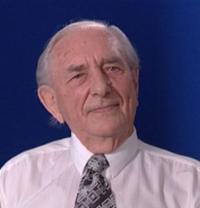I would never be willing to join the Party and under no circumstances I would cooperate with the State Security
Oto Batelka was born in 1920 in the village of Horní Meziříčko in Dačice district. His father was an officer in Austro-Hungarian army, who was present at all the front events in the First World War, and who finally worked as a staff sergeant at the Bratislava Castle. Later he took early retirement. His mother was a housewife who cared for their three children. Even in his youth Oto used to perceive various political and power changes in the country really intensively. All those events culminated when the Red Army overran the country and totalitarianism was established. During the first years of a new era, he helped many people to cross the river Morava and flee abroad. In 1948 he was arrested and imprisoned for that „anti-state activity“. He managed to send a message from prison to his brother who was working at a high position at that time. Subsequently he had informed other people involved in this case, so Oto was labelled as a reliable person and they offered him favourable conditions for collaboration with the State Security. He radically refused this opportunity to regain his freedom. He had never signed any agreement, nor did he join the Party. When Gottwald was elected the President, he proclaimed amnesty thanks to which Oto Batelka was released from the prison. He had to move away from Bratislava and live in fear and uncertainty. He suspected the retraction of amnesty and the warrant for his arrest was issued soon. For the first time he managed to escape almost from the State Security‘s handcuffs; however, he fell into the trap when he tried to cross the border. In the prison he met a lot of notable political prisoners such as M. Horáková, J. Ursíny, B. Jaško and A. Púčik who was even his cellmate. Though there were many calumnies brought against him, Oto Batelka had always walked with the clean slate.

